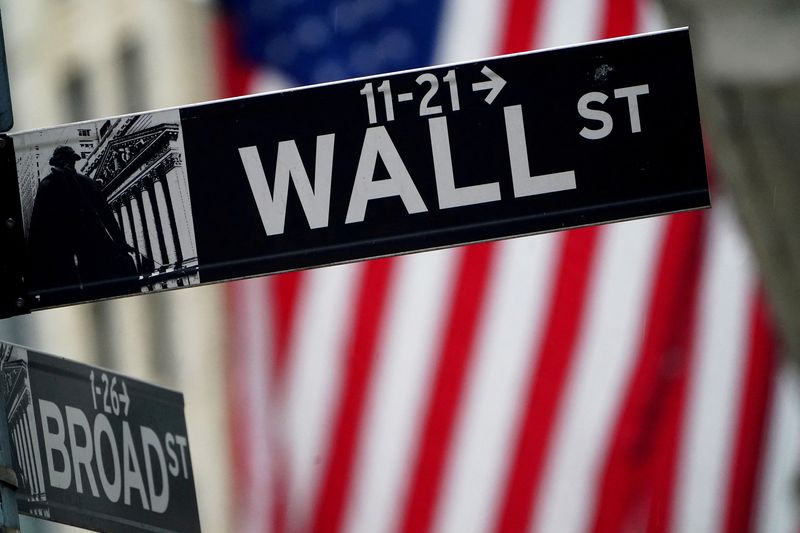
© Reuters. FILE PHOTO: A Wall Road signal outdoors the New York Inventory Change in New York Metropolis, New York, U.S., October 2, 2020. REUTERS/Carlo Allegri/File Picture/File Picture/File Picture
By David Randall and John McCrank
NEW YORK (Reuters) – From meme-stock lovers to retirees, this 12 months’s steep dive for each shares and U.S. Treasury costs has upended portfolios for particular person traders who had loved watching their wealth develop throughout the historic rally in monetary belongings early within the coronavirus pandemic in 2020.
Wall Road’s brutal tumble continued on Wednesday, with the worst one-day loss since June 2020 for the . The benchmark index is now down 17.5% from its peak initially of the 12 months, erasing $499 billion in market worth. At one level the S&P was down almost 20% and on the cusp of confirming a bear market.
In contrast to many previous market selloffs, this downturn has additionally slammed U.S. Treasuries costs, pushing up yields, because the Federal Reserve started to reverse the simple cash insurance policies that supported the financial system throughout pandemic lockdowns.
Rising extra pessimistic, retail merchants offered $87 million in equities on internet up to now week as much as Tuesday, versus a one-year common of $3.3 billion in internet buys, based on a observe from JPMorgan (NYSE:).
Usually, Treasuries have been thought-about among the many world’s most secure investments. However to date in 2022, the ICE (NYSE:) BofA US Treasury Index is down 9.3%, the worst begin to the 12 months for Treasuries since 1830 based on Deutsche Financial institution (ETR:). This has slammed traders who counted on the bond marketplace for revenue and as a buffer in opposition to potential inventory market losses.
“Most traders have by no means seen a market surroundings like this,” mentioned Christine Benz, director of private finance at Morningstar. “It might worsen earlier than it will get higher, and that can actually take a look at traders’ endurance.”
Many high-flying development and tech shares soared throughout the pandemic, and their steep decline has rattled traders who had wager on them, hoping for the type of eye-popping rallies seen early final 12 months in GameStop (NYSE:) and different so-called meme shares.
“What I’m seeing is similar factor everybody else is seeing who began 18-to-24 months in the past, like, ‘oh, have a look at all the inexperienced, going up, up, up,’ after which impulsively it’s like, ‘oh crud, what is going on?'”, mentioned Alex Rutfield, 29, an engineer within the Boston suburbs who has invested over $50,000 in shares and ETFs that embrace web and robotics corporations. He mentioned the worth of his portfolio has fallen again to round even.
DOUBLE WHAMMY
The twin selloffs in shares and bonds have been notably troublesome on particular person traders who counted on a mixture of shares and bonds to blunt declines of their portfolios, with shares ideally rising amid financial optimism and bonds strengthening throughout turbulent occasions.
That technique doesn’t work when shares and bonds fall in unison. The BlackRock (NYSE:) 60/40 Goal (NYSE:) Allocation fund, which follows an ordinary portfolio strategy of protecting 60% of its belongings in equities and 40% in fastened revenue to restrict danger, is down almost 12% for the reason that begin of the 12 months, its worst efficiency because it launched in 2006.
The majority of the promoting in each shares and bonds has been coming from wealthier and older traders, who’re lowering their general danger publicity, primarily via the promoting of mutual funds, based on knowledge from Vanda (NASDAQ:) Analysis.
Bruce Bagley, 69, founder Santa Rosa Uniform & Profession Attire in Santa Rosa, California, mentioned he has held the course to date in his portfolio, which is 55% shares, 40% bonds, with the remaining in money, despite the fact that all the pieces however his REIT investments have been falling.
“The place else are you going to place your cash?” he mentioned.
Traders who had massive allocations to bonds, which make up some 20% of retirement accounts on common, based on Morningstar, have canceled trip plans, are consuming in additional typically, and have reconsidered help to different members of the family, mentioned Melanie Nichols, a wealth advisor at WA Asset Administration in Birmingham, Alabama.
“When you could have one a part of a portfolio that’s offering all of your revenue and now you see it down 10% that is horrifying,” she mentioned. “Persons are not used to these returns as a result of we don’t have these returns within the bond market fairly often.”
Different retirees are on the lookout for different sources of revenue to attempt to rebuild their nest egg.
“You assume you could have sufficient to reside off for years and now you do not know if it can come again,” mentioned one 73-year previous former advertising government within the Cleveland suburbs who had about 30% of her portfolio in bonds and mentioned she was contemplating discovering part-time work to assist protect her retirement financial savings.
“Purchasers who had bigger allocations to bonds and who actually didn’t wish to expertise volatility are feeling this, and it has been very destabilizing for these of us,” mentioned John Cunnison, chief funding officer at Baker Boyer in Walla Walla, Washington.